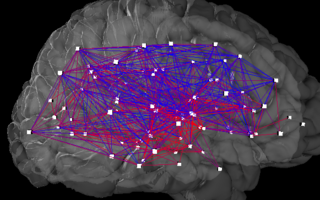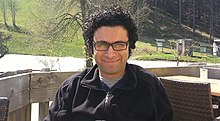
Scientific citation is providing detailed reference in a scientific publication, typically a paper or book, to previous published communications which have a bearing on the subject of the new publication. The purpose of citations in original work is to allow readers of the paper to refer to cited work to assist them in judging the new work, source background information vital for future development, and acknowledge the contributions of earlier workers. Citations in, say, a review paper bring together many sources, often recent, in one place.

The Oxford Internet Institute (OII) serves as a hub for interdisciplinary research, combining social and computer science to explore information, communication, and technology. It is an integral part of the University of Oxford's Social Sciences Division in England.
In natural evolution and artificial evolution the fitness of a schema is rescaled to give its effective fitness which takes into account crossover and mutation.
In web analytics and website management, a pageview or page view, abbreviated in business to PV and occasionally called page impression, is a request to load a single HTML file of an Internet site. On the World Wide Web, a page request would result from a web surfer clicking on a link on another page pointing to the page in question.
PLOS Computational Biology is a monthly peer-reviewed open access scientific journal covering computational biology. It was established in 2005 by the Public Library of Science in association with the International Society for Computational Biology (ISCB) in the same format as the previously established PLOS Biology and PLOS Medicine. The founding editor-in-chief was Philip Bourne and the current ones are Feilim Mac Gabhann and Jason Papin.
Wikipedia has been studied extensively. Between 2001 and 2010, researchers published at least 1,746 peer-reviewed articles about the online encyclopedia. Such studies are greatly facilitated by the fact that Wikipedia's database can be downloaded without help from the site owner.
Molecular communications systems use the presence or absence of a selected type of molecule to digitally encode messages. The molecules are delivered into communications media such as air and water for transmission. The technique also is not subject to the requirement of using antennas that are sized to a specific ratio of the wavelength of the signal. Molecular communication signals can be made biocompatible and require very little energy.

Integrated information theory (IIT) proposes a mathematical model for the consciousness of a system. It comprises a framework ultimately intended to explain why some physical systems are conscious, and to be capable of providing a concrete inference about whether any physical system is conscious, to what degree, and what particular experience it is having; why they feel the particular way they do in particular states, and what it would take for other physical systems to be conscious.
Culturomics is a form of computational lexicology that studies human behavior and cultural trends through the quantitative analysis of digitized texts. Researchers data mine large digital archives to investigate cultural phenomena reflected in language and word usage. The term is an American neologism first described in a 2010 Science article called Quantitative Analysis of Culture Using Millions of Digitized Books, co-authored by Harvard researchers Jean-Baptiste Michel and Erez Lieberman Aiden.

The Google Ngram Viewer or Google Books Ngram Viewer is an online search engine that charts the frequencies of any set of search strings using a yearly count of n-grams found in printed sources published between 1500 and 2019 in Google's text corpora in English, Chinese (simplified), French, German, Hebrew, Italian, Russian, or Spanish. There are also some specialized English corpora, such as American English, British English, and English Fiction.

Kate Robb is an Australian marine mammalogist who, along with colleagues, declared in 2011 a new species of the genus Tursiops, and formally named it the Burrunan dolphin, Tursiops australis. She is the Founding Director and Head of Research at the Marine Mammal Foundation in Melbourne in the Australian state of Victoria.

Filippo Menczer is an American and Italian academic. He is a University Distinguished Professor and the Luddy Professor of Informatics and Computer Science at the Luddy School of Informatics, Computing, and Engineering, Indiana University. Menczer is the Director of the Observatory on Social Media, a research center where data scientists and journalists study the role of media and technology in society and build tools to analyze and counter disinformation and manipulation on social media. Menczer holds courtesy appointments in Cognitive Science and Physics, is a founding member and advisory council member of the IU Network Science Institute, a former director the Center for Complex Networks and Systems Research, a senior research fellow of the Kinsey Institute, a fellow of the Center for Computer-Mediated Communication, and a former fellow of the Institute for Scientific Interchange in Turin, Italy. In 2020 he was named a Fellow of the ACM.
WikiWarMonitor is a website dedicated to resolving Wikipedia edit wars. It is operated by a group of researchers from Oxford Internet Institute, Rutgers University, and Central European University.

The Budapest Reference Connectome server computes the frequently appearing anatomical brain connections of 418 healthy subjects. It has been prepared from diffusion MRI datasets of the Human Connectome Project into a reference connectome, which can be downloaded in CSV and GraphML formats and visualized on the site in 3D.

Helen Zerlina Margetts, is Professor of Internet and Society at the Oxford Internet Institute (OII), University of Oxford and from 2011 to 2018 was Director of the OII. She is currently Director of the Public Policy Programme at The Alan Turing Institute. She is a political scientist specialising in digital era governance and politics, and has published over a hundred books, journal articles and research reports in this field.
Science information on Wikipedia includes the information that Wikipedia presents about science. There have been critiques of and discussion about the impact and quality of that information, and of the interactions of Wikipedia editors, scientists and public engagement with the information.
Real or perceived ideological bias on Wikipedia, especially on its English-language edition, has been the subject of academic analysis and public criticism of the project. Questions relate to whether its content is biased due to the political, religious, or other ideology its volunteer editors may adhere to. These all draw concerns as to the possible effects this may have on the encyclopedia's reliability.

Ganesh Bagler is known for his research in computational gastronomy, an emerging data science of food, flavors and health. By blending food with data and computation he has helped establish the foundations of this niche area. Starting with the investigation of food pairing in the Indian cuisine, his lab has contributed to computational gastronomy with studies on culinary fingerprints of world cuisines, culinary evolution, benevolent health impacts of spices, and taste prediction algorithms.
Sherry Towers is an American and Canadian statistician and data scientist working as an independent consultant and an affiliate scholar with the Institute for Advanced Sustainability Studies in Potsdam, Germany following a seven year position as a faculty research associate at Arizona State University. Towers is perhaps best known for her study of the contagion effect of mass shootings. She is also the founder and owner of Towers Consulting LLC, a consulting company that provides visual analytics, data mining, applied statistics, and computational modeling services to industry, academia, and the public sectors.









